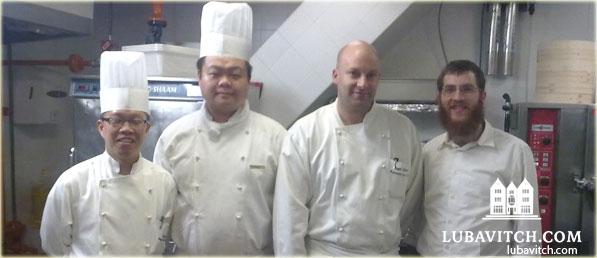(lubavitch.com) Expo fever is raging in Shanghai. The World Expo of 2010—the largest to date—opened Saturday, May 1. One hundred world leaders will participate, and 190 countries will be represented in its pavilions and exhibitions.
Themed “Better City – Better Life,” the Expo, anticipating some 70 million visitors over its six month duration, will also showcase Shanghai’s status as a world city. An estimated 35,000 Jews are expected at the Expo, and Chabad-Lubavitch representatives in Shanghai are prepared to greet them.
Official religious activities are not allowed in association with the Expo itself, but Chabad has initiated several projects including Shabbat meals in the downtown area and a kosher minimarket that will deliver orders made through their website – chinajewish.org. Chabad representatives will also assist in arranging tours of Shanghai’s historical Jewish sites and current communal buildings.
Under the leadership of Rabbi Sholom and Dini Greenberg Chabad of Shanghai already has three couples working at capacity to serve its Jewish population. But with the Expo, demands on Chabad’s services have soared, prompting the Greenbergs to recruit Rabbi Mendy and Sara Alevsky from New York to help. Together, the couples are working hard to provide a “home away from home” for Jewish visitors
Rabbi Alevsky, who describes every connection he makes with a visitor as “a world unto itself,” sees a particular advantage in Shanghai’s exotic locale.
“Very often,” he says, “I’ve seen people who have not have participated in Jewish life back at home suddenly feel a desire to reconnect with their roots while traveling abroad.”
While Jewish merchants linked with the famed Silk Route have had a presence in China for nearly one thousand years, the first modern Jewish presence in Shanghai began in the 1850s when Jewish traders of Iraqi descent settled here. A symbol of the community’s wealth and success is the Ohel Rachel Synagogue, built at the time to serve as the center for Jewish life in Shanghai.
During the Second World War, some 18,000 Jewish refugees from Eastern Europe were resettled by the occupying Japanese forces. For the first time in history, a slice of shtetl life could be found in the Far East. The refugees were helped in large part, by Rabbi Meir Ashkenazi, a member of the Chabad-Lubavitch movement who had been invited by Shanghai’s Russian Jewish community in 1928 to serve as rabbi. At the war’s end, many of the city’s Jewish refugees emigrated from Shanghai in the hopes of starting their lives anew in the United States and Israel, and from the early 1950s through the early 1990s Jewish life here came to a halt.
In the last two decades, Shanghai has seen a striking Jewish revival as Jewish émigrés—a majority of them American and French expats—began arriving here. The Greenbergs, in Shanghai since 1998, have been a vital force in the city’s Jewish renaissance, working hard to create a positive experience for its 1500 Jewish residents and thousands of visiting tourists and businessmen. They have since expanded to accommodate the growing demands, with additional Chabad representatives now serving Chabad of Pudong, and another couple serving the French Jewish community.
Today Shanghai has its own Jewish day school, mikvah, and a kosher restaurant. A major player on the international scene, the city now boasts one of the world’s fastest growing major economies, and its Jewish community has grown with it in leaps and bounds. Estimates currently put the local Jewish community’s population increase at 30% annually.
Sarah Alvesky is working with a diverse population and trying to create a warm, welcoming atmosphere—something she learned to do as a child. As the daughter of Chabad emissaries in Vienna, Austria, Sara “encountered many different people from very diverse backgrounds,” she says.
“In the three weeks that we’ve been in China, I’ve found those childhood experiences have been immensely helpful in welcoming the people passing through the Jewish center.”
Hopefully, she says, Jewish visitors will take away a good Jewish experience from their time in Shanghai, “and it will enhance their visit to China overall.”

Be the first to write a comment.